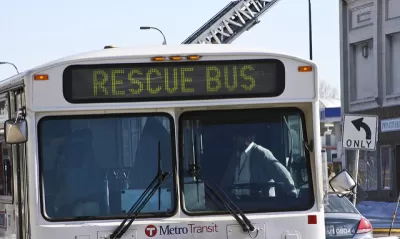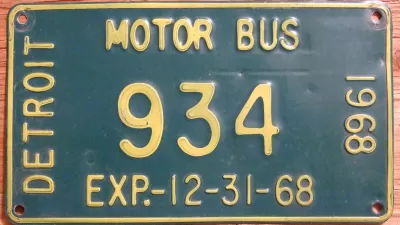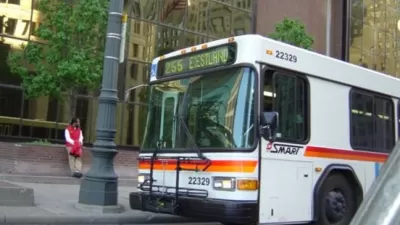A $4.6 billion transit plan proposed by the Regional Transit Authority of Southeast Michigan received 49.5 percent of the vote on November 8. The millage tax would have funded bus rapid transit and regional rail within a four-county region.

Planetizen's Oct. 27 post by contributing editor Philip Rojc sounded optimistic on the outlook for passage of the regional transit plan:
All signs point to broad regional support for the measure. "Some opposition emerged from the northern suburbs, but key political actors who could have blocked it, like Oakland County Executive Brooks Patterson (the 'Sprawl King') have opted not to."
In fact, the northern suburbs in Macomb County killed the measure. Only 40 percent of county voters supported the critical transit measure, ensuring its defeat, reports Ryan Stanton for The Ann Arbor News on Mlive.com on Nov. 9. Patterson had played an important role in killing an earlier version of the transit plan.
- In Wayne County, with all precincts reporting, it received 53% support.
- In Oakland County, with all precincts reporting, received 49.91% support.
- In Washtenaw County, with all precincts reporting, it received 56% support.
In an email on Wednesday evening, Stanton confirmed that the 'yes' votes from the four counties totaled 49.5 percent.
The RTA expressed its disappointment on its homepage with a statement by Paul Hillegonds, Chair of the Regional Transportation Authority (RTA) and Michael Ford, CEO of the RTA:
It leaves southeast Michigan as the only large region in the nation (and one of a few in the world) without a functioning regional rapid transit system
According to RTA's Master Plan, the millage tax would have been "at a rate of 1.2 mills ($1.20 per $1,000 of taxable value) for 20 years beginning in 2016 and ending in 2035."
"The tax would have cost the owner of a home with a $200,000 market value and a $100,000 taxable value about $120 per year," writes Stanton. "It's estimated it would have generated more than $160 million in revenue for the RTA in the first year."
By law, transit advocates must wait two years before they can try again with the voters.
Rojc wrote earlier that the plan would have added:
[F]our bus rapid transit (BRT) lines connecting Detroit to regional employment centers outside the city proper (as far as Pontiac and Ann Arbor). On top of that, 'regional rail between Ann Arbor and Detroit's downtown.
Related in the media:
- Mlive.com: What's next for metro Detroit regional transit after voters reject tax?, November 09, 2016
- The Detroit News: RTA transit overhaul millage nears rejection, November 9, 2016
Related in Planetizen:
- Election Roundup: Planning's Big Day at the Ballot Box, November 9, 2016
- Detroit Ballot Measure Puts Regional Transit in Reach, October 27, 2016
- A Call to Action After Detroit Suburbs Kill Regional Transportation Plan, August 3, 2016
FULL STORY: 234 748 shares Regional transit tax proposal defeated in southeast Michigan

Planetizen Federal Action Tracker
A weekly monitor of how Trump’s orders and actions are impacting planners and planning in America.

Maui's Vacation Rental Debate Turns Ugly
Verbal attacks, misinformation campaigns and fistfights plague a high-stakes debate to convert thousands of vacation rentals into long-term housing.

Cuomo Is the Candidate of Both NIMBYs and Developers. What Gives?
In the New York City mayoral race, odd bedfellows align to preserve the housing status quo.

San Antonio and Austin are Fusing Into one Massive Megaregion
The region spanning the two central Texas cities is growing fast, posing challenges for local infrastructure and water supplies.

Charlottesville Temporarily Has No Zoning Code
A judge ordered the Virginia city to throw out its newly revised zoning code, leaving permitting for new development in legal limbo.

In California Battle of Housing vs. Environment, Housing Just Won
A new state law significantly limits the power of CEQA, an environmental review law that served as a powerful tool for blocking new development.
Urban Design for Planners 1: Software Tools
This six-course series explores essential urban design concepts using open source software and equips planners with the tools they need to participate fully in the urban design process.
Planning for Universal Design
Learn the tools for implementing Universal Design in planning regulations.
Heyer Gruel & Associates PA
JM Goldson LLC
Custer County Colorado
City of Camden Redevelopment Agency
City of Astoria
Transportation Research & Education Center (TREC) at Portland State University
Jefferson Parish Government
Camden Redevelopment Agency
City of Claremont




























